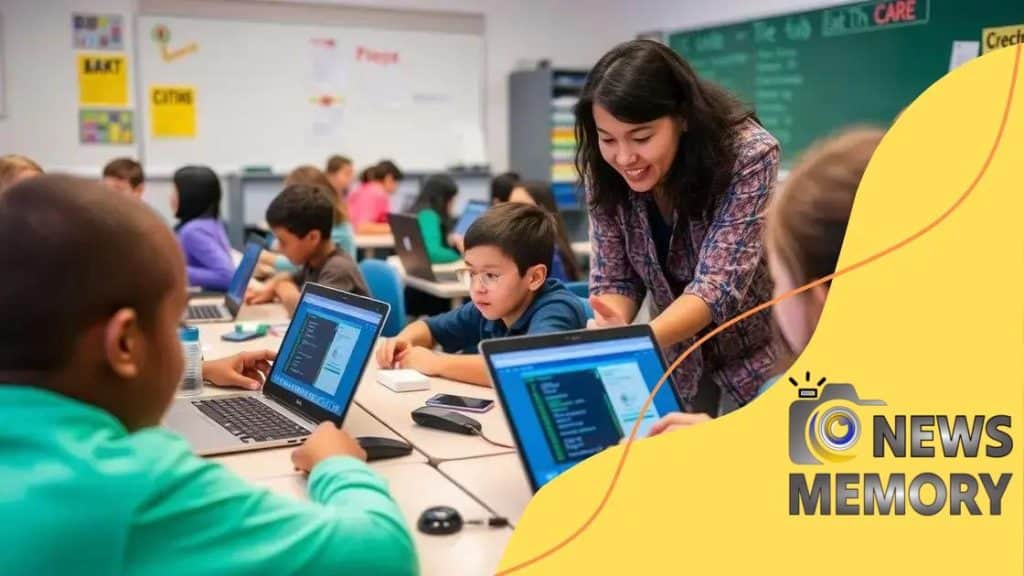The growing importance of coding in K-12 education

The growing importance of coding in K-12 education equips students with essential skills for future careers, enhances problem-solving abilities, and encourages creativity and critical thinking in a technology-driven world.
The growing importance of coding in K-12 education is reshaping how we prepare students for the future. Have you ever wondered how coding skills impact creativity and problem-solving among young learners? Let’s dive into this crucial topic.
Why coding is crucial for today’s students
Coding is becoming a vital skill for students in today’s digital world. From shaping their understanding of technology to boosting their future job prospects, coding plays a key role in education.
Enhancing Problem-Solving Skills
Learning to code encourages students to think critically and solve problems effectively. They learn to break down complex issues into manageable parts, fostering a mindset geared towards solutions.
Boosting Creativity
Coding isn’t just about logic; it’s also a creative outlet. Students can build games, develop apps, or create websites, allowing them to express themselves through technology. This blend of logic and creativity makes coding engaging.
Improving Collaboration
Many coding projects require teamwork, teaching students the importance of working together. Collaboration enhances their communication skills and helps them understand different perspectives.
- Coding improves analytical thinking.
- Encourages teamwork and collaboration.
- Builds resilience through trial and error.
- Provides opportunities for creative expression.
As more industries adopt technology, the demand for coding skills will only increase. By equipping students with these skills, they become better prepared for the future.
The benefits of teaching coding in schools
Teaching coding in schools brings numerous advantages to students. It equips them with essential skills that are highly regarded in today’s job market.
Life Skills Development
Coding not only fosters technological proficiency but also helps students develop crucial life skills. By working on coding projects, students learn to manage their time effectively and stay organized, which are vital skills in both school and their future careers.
Engaging the Mind
The process of learning to code can captivate students’ attention and engage their minds. As they tackle challenges, students enhance their cognitive abilities and gain confidence in their problem-solving skills. This engagement can also boost their interest in STEM fields.
- Coding enhances analytical thinking.
- Fosters creativity through project-based learning.
- Encourages persistence while debugging code.
- Builds collaboration through group projects.
Moreover, the exposure to coding can inspire students to pursue tech-related fields. As technology continues to evolve, having a strong foundation in coding can open doors to future opportunities. Students gain insights into how technology shapes our world, making learning more relevant and exciting.
How coding enhances problem-solving skills

Learning how to code directly impacts students’ problem-solving skills. By navigating coding projects, students acquire valuable techniques to approach and resolve challenges efficiently.
Critical Thinking Development
Coding requires students to analyze situations and think critically about solutions. They learn to assess problems from various angles and choose the best course of action. This kind of thinking is applicable not just in coding but in real-life scenarios as well.
Encouraging a Trial-and-Error Mindset
When coding, students often make mistakes and face bugs in their code. This process teaches resilience as they learn to debug effectively. Embracing mistakes as part of the learning journey encourages persistence and a positive attitude toward challenges.
- Coding teaches students to break down complex problems.
- It cultivates logical thinking and reasoning.
- Fosters a systematic approach to find solutions.
- Enhances creativity in devising unique solutions.
Engaging with coding promotes collaboration as students often work in teams. They share ideas and perspectives, leading to more innovative solutions. This teamwork aspect is also crucial in developing communication skills, which further enrich their problem-solving toolkit.
Effective methods for introducing coding
Introducing coding to students can be both exciting and challenging. Utilizing effective methods ensures that students engage with the material and develop essential skills.
Hands-On Learning
Hands-on experience is one of the best ways to introduce coding. Students learn best when they can interact with the material. Coding games and interactive platforms can make learning fun and accessible. These tools allow students to experiment and create in a supportive environment.
Project-Based Learning
Incorporating project-based learning allows students to apply their coding skills in real-world scenarios. Developing small applications or games can motivate students as they see their ideas take shape. This approach fosters creativity and innovation, letting students explore their interests.
- Use coding competitions to encourage teamwork.
- Introduce pair programming for collaborative learning.
- Implement bite-sized lessons for easier absorption.
- Host coding clubs or after-school programs for additional practice.
Another effective method is integrating coding into existing subjects. For instance, using coding to create data visualizations in science or art projects can enhance learning in those areas. This cross-disciplinary approach makes coding relevant and shows its applications in various fields.
Future career prospects in tech-focused education
The landscape of education is rapidly evolving, and tech-focused education plays a vital role in shaping future career prospects. As technology continues to integrate deeper into all fields, students equipped with coding and digital skills will find more opportunities available to them.
Diverse Career Opportunities
With a foundation in coding, students can explore various career paths. Fields like software development, data analysis, and cybersecurity are just a few options. The demand for skilled tech workers is growing, providing a wide range of employment opportunities.
Preparing for the Future
As industries evolve, future employees will need to adapt to new technologies. Teaching students coding now prepares them to face these challenges. It instills a mindset of lifelong learning and adaptability, which are crucial traits in the tech industry.
- Software development: Building apps and websites.
- Data science: Analyzing and interpreting complex data.
- Cybersecurity: Protecting systems against security breaches.
- Game development: Creating immersive gaming experiences.
Moreover, tech skills open doors beyond traditional tech roles. Many sectors, such as healthcare, finance, and education, are increasingly seeking individuals who can utilize technology effectively. A background in coding enhances employability and prepares students for a broad range of job functions.
FAQ – Frequently Asked Questions about Coding in K-12 Education
Why is coding important for students today?
Coding is essential as it develops critical thinking, creativity, and problem-solving skills. It prepares students for future careers in a tech-driven world.
What career opportunities are available for students who learn coding?
Students who learn coding can pursue careers in software development, data science, cybersecurity, and many other tech-related fields.
How can coding enhance a student’s problem-solving abilities?
Learning coding encourages students to analyze problems critically and find innovative solutions, fostering a strong problem-solving mindset.
What methods are effective for introducing coding in schools?
Hands-on learning, project-based activities, and integrating coding with other subjects are effective methods to engage students in coding education.





